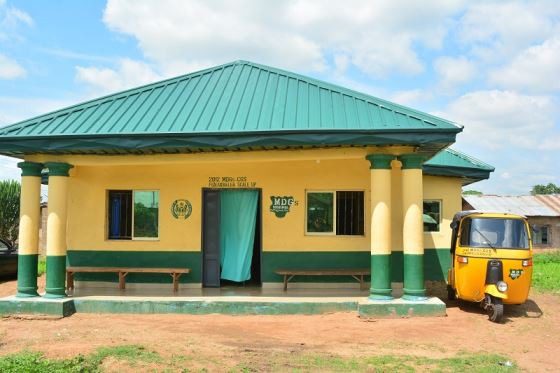Forgotten Dairies
How Social (Gender and Faith) Norms Normalize Corruption in Nigeria’s Primary Healthcare System – and What if Corruption Isn’t Just About Bad Leadership? -By Isa Salisu
Empowering women — both as health workers and as patients — is central to disrupting the entrenched dynamics that suppress accountability. When women are equipped with the confidence, education, and institutional support to speak up, question unethical practices, and hold leadership positions, they become not only protectors of their own dignity but also catalysts for broader integrity in the system. Equally important is engaging religious leaders, who possess unparalleled influence in shaping values and moral conduct. By partnering with mosques, churches, and other faith-based institutions, anti-corruption efforts can be framed not just as political or legal matters, but as spiritual imperatives rooted in justice, equity, and stewardship.

In public discourse about the crisis of corruption in Nigeria’s primary healthcare sector, the blame is almost always pointed toward failed leadership. Indeed, issues such as embezzlement of funds, ghost workers, and misappropriation of medical supplies are serious concerns. But what if the problem runs deeper than the visible dysfunction of those in power? What if the roots of healthcare corruption are embedded not just in official misconduct, but in the everyday cultural, religious, and gender-based expectations that govern how people behave and interact in society?
This isn’t to excuse the criminal behavior of corrupt officials or healthcare workers. Rather, it’s to recognize that a system so thoroughly broken is not sustained by a few bad apples — it’s maintained by a whole social environment that either tolerates, protects, or fails to challenge corruption. In Nigeria, social norms — especially those shaped by gender roles and religious beliefs — quietly but powerfully normalize corruption, making it part of daily life rather than an exceptional wrongdoing.
HOW GENDER NORMS REPRODUCE CORRUPTION IN HEALTHCARE
At first glance, gender may not seem directly connected to corruption. But in Nigeria’s healthcare system, patriarchy influences everything from access to services to accountability within institutions. In many rural and semi-urban areas, men dominate leadership positions in health management despite women forming a significant percentage of the health workforce — particularly in nursing, midwifery, and community health extension roles. This unequal power structure affects who makes decisions and who is listened to.
Women often have less bargaining power when seeking healthcare. Cultural norms that promote female modesty and obedience discourage women from complaining when they are extorted, denied care, or mistreated. In conservative settings, a woman might feel ashamed or fearful to question a male health worker asking for bribes or favors, especially if she’s uneducated or economically disadvantaged.
Moreover, when female health workers witness unethical practices, they are less likely to speak out. The threat of being labeled “disrespectful,” “stubborn,” or “a troublemaker” carries real consequences — including job insecurity or social isolation. In systems where loyalty and silence are rewarded more than competence and honesty, whistleblowing becomes nearly impossible.
This culture of silence perpetuates corruption. When women internalize the idea that their voices matter less, or that challenging authority is improper, corrupt practices become not just invisible — they become expected.
THE RELIGIOUS DIMENSION: WHEN FAITH JUSTIFIES INJUSTICE
Religion plays a central role in Nigerian society, influencing how people view health, illness, death, and even justice. This spiritual worldview, while providing comfort and community, can also enable a passive acceptance of systemic failure.
Many Nigerians hold deep-seated beliefs that health outcomes are ultimately controlled by divine forces — a concept that can dilute the urgency of demanding quality service. If a patient dies due to medical negligence, some may say, “It was God’s time.” If a woman is turned away because she can’t afford an unofficial fee, the community may not protest — believing that God will provide another way.
This fatalistic attitude removes pressure from healthcare providers and the government to improve systems. It shifts responsibility from human agents to divine will. Even when corruption is evident — such as a nurse selling free vaccines or a doctor inflating bills — people may hesitate to speak up, fearing they will be accused of challenging God’s plan or being disrespectful to religious authority.
Worse still, some healthcare providers use religion as a tool to mask unethical behavior. They invoke God’s name to justify bending rules for certain groups — for instance, giving preferential treatment to church members or Islamic scholars while others suffer neglect. While such favoritism may be seen as pious or generous within faith communities, it directly undermines the principle of equal access to healthcare.
COMMUNITY LOYALTY, INFORMALITY, AND THE NORMALIZATION OF CORRUPTION
Outside the official policies and procedures that govern Nigeria’s healthcare system lies another, more influential system: the informal culture of communal loyalty and obligation. In many communities, the line between professional duty and social expectation is blurred. Health workers are often expected to help friends, neighbors, or relatives in ways that breach regulations — whether that means hiring unqualified aides, diverting drugs, or allowing unauthorized access to hospital facilities.
Refusing these informal requests is seen not as integrity, but as arrogance or betrayal. A clinic manager who insists on following due process might be viewed as selfish or “not one of us.” The result? Corrupt behaviors are rebranded as acts of kindness or social responsibility. Stealing drugs for resale might be rationalized as “hustle.” Accepting bribes could be seen as a way to “survive in Nigeria.”
This culture breeds a kind of communal complicity. Everyone knows what’s happening, but no one intervenes — either because they benefit from it, fear retaliation, or have simply accepted that “this is how the system works.” This silent endorsement gives corruption its greatest weapon: invisibility.
WHY REFORMS FAIL: THE LIMITS OF POLICY WITHOUT CULTURAL CHANGE
Many attempts to reform Nigeria’s healthcare sector have focused on laws, policies, and administrative procedures. These include budget tracking, procurement transparency, biometric staff monitoring, and patient complaint mechanisms. Yet, corruption persists — often flourishing under new disguises.
Why? Because these reforms fail to address the underlying social and cultural norms that shape behavior. A health worker who has been taught all her life that respect for elders means never questioning them is unlikely to challenge an older supervisor engaged in fraud. A patient who believes God controls their fate is unlikely to demand better care or report a bribe.
Without tackling the social infrastructure of corruption, reforms are reduced to surface-level interventions. They may change the rules, but they don’t change the people’s mindset — or the social pressures that drive corruption in the first place.
A SOCIALLY-INFORMED SOLUTION: CHANGING THE NORMS, NOT JUST THE RULES
Addressing corruption in Nigeria’s primary healthcare system demands a fundamental shift in how society understands and responds to it. While policy reforms, audits, and stricter enforcement of laws are important, they will always fall short if they fail to confront the social norms that give corruption room to thrive. Cultural beliefs around gender, religion, and community loyalty must be reimagined as part of the solution, not left untouched as sacred ground. Any real transformation must begin by acknowledging the silent but powerful influence of these norms on people’s behaviors, decisions, and expectations within the health system.
Empowering women — both as health workers and as patients — is central to disrupting the entrenched dynamics that suppress accountability. When women are equipped with the confidence, education, and institutional support to speak up, question unethical practices, and hold leadership positions, they become not only protectors of their own dignity but also catalysts for broader integrity in the system. Equally important is engaging religious leaders, who possess unparalleled influence in shaping values and moral conduct. By partnering with mosques, churches, and other faith-based institutions, anti-corruption efforts can be framed not just as political or legal matters, but as spiritual imperatives rooted in justice, equity, and stewardship.
Communities, too, must begin to see themselves not as powerless victims of a corrupt system but as participants who either challenge or uphold it. When health workers fear community backlash more than administrative sanctions, then integrity becomes a community-enforced standard. This can be achieved through grassroots mobilization, dialogue circles, and storytelling campaigns that redefine what is acceptable and honorable in public service. At the heart of this change is the need to replace silence with voice, fear with awareness, and blind tolerance with shared accountability. As long as corruption is seen as a necessary evil or a cultural norm, no amount of reform will fix the system. But when society decides that integrity is not just a policy — it is a collective value — then real healing can begin.










